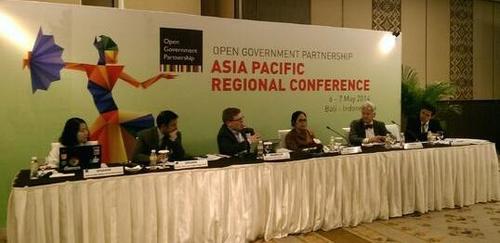Issues of legislative openness and citizen engagement were highlighted at the European and Asia Pacific regional meetings of the Open Government Partnership (OGP) last week, as NDI and partners in the Chilean Congress organized sessions of the Legislative Openness Working Group.
At the Asia Pacific regional conference in Bali (May 6-7), an event hosted by Indonesian President Susilo Bambang Yudhoyono, I had the pleasure of moderating a panel of high-level officials from government, parliament and civil society. The panel delved into the challenges that parliaments face in engaging citizens who often have a declining trust in government.
New Zealand Internal Affairs Minister Peter Dunne described his government’s use of technology to respond to citizens’ increasing expectations, saying, “Not only are people much more willing to engage using the Internet, they expect to transact and engage via the Internet.” Dunne said that nearly 60 percent of New Zealanders report using government services online, a win-win. “This shift in the use of technology gives governments the ability to reach a wider audience for lower cost.”

Panelists address the audience in a LOWG session at the OGP Asia Pacific regional conference in Indonesia.
New Zealand also has ascribed this strategy to the legislative branch. It was the first country to attempt to crowdsource citizen input into legislation, creating an online “wiki” to collect citizens’ ideas on the 2008 Policing Act. The Parliament continues to allow online citizen submissions around draft bills under consideration as part of its recently launched beta.govt.nz website, which also provides a plethora of information about parliamentary activity.